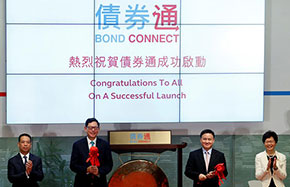OTC equity pilot program set to expand
China is stepping up the expansion of its new over-the-counter equity exchange system in its efforts to create a multi-level capital market.
The National Equities Exchange and Quotations - the so-called "third board", an equity exchange system for small- and medium-sized enterprises - is to expand its pilot sites this year, an official told China Daily on Friday.
It is China's third national equity exchange after Shanghai Stock Exchange and Shenzhen Stock Exchange the only over-the-counter market regulated by China Securities Regulatory Commission.
The exchange was founded in 2012 and put into operation in January this year.
"We are going to expand pilot sites to include all national high-tech industrial development zones in China and then to the whole of the country," said the official, who declined to be named.
Currently, unlisted enterprises from four high-tech industrial parks in Beijing, Tianjin, Shanghai and Wuhan in Hubei province can apply to trade equities.
He added that all Chinese companies that meet the requirements will be able to trade equities on the exchange.
Officials are paying close attention to how the trading platform is structured, and the complete system should be live by the fourth quarter of this year, he said.
"Access terms for companies trading on the exchange will be more detailed," he added.
By the end of February, 205 enterprises had registered to trade - with 5.7 billion shares listed on the third exchange - of which 179 were in Beijing, eight in Tianjin, eight in Shanghai and 10 in Wuhan.
By the end of 2012, the market value of enterprises on the exchange totaled 22 billion yuan ($3.59 billion), and 115 million shares totaling 584 million yuan had been traded.
An expansion of the NEEQ pilot sites is regarded as an important task in deepening the reform of economic system.
A State Council meeting in May, chaired by Premier Li Ke-qiang, urged to expand equity transactions as an economic reform priority.
CSRC confirmed the NEEQ as a national equity exchange in February and said that the number of shareholders of non-listed small and medium-sized enterprises in the market could be more than 200.
Tianjin Equity Exchange, as the earliest regional equity exchange in China, has attracted 292 enterprises from 26 provinces, with a total market value of more than 24.5 billion yuan, since its opening in 2008.
The exchange has helped them raise funds worth 12.3 billion yuan, of which 5.1 billion yuan was directly raised from the exchange and 5.6 billion yuan from banks.
"We are paying attention to the development of Tianjin Equity Exchange because it is a good source of financing for non-public and unlisted companies," said Cui Jindu, the deputy mayor of Tianjin.
Cui said China should consider the combination of the markets to help create a more mature multi-level national capital market.
Shenzhen, Guangzhou, and the provinces of Zhejiang, Jiangsu and Fujian are also setting up regional equity exchanges after the CSRC introduced policies in August last year to encourage the creation of regional equity exchanges.

























